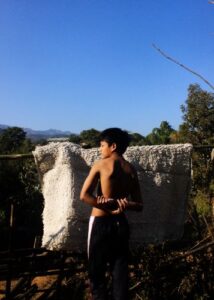Team L&M
IIC New Delhi has put up a contemporary exhibition Life & Journey in Lamka that showcases history, culture and creativity of Lamka town in Manipur. Inspired by their connection with their hometown, this exhibition brings together more than a 100 young artists, designers, dreamers and writers from Lamka through photographs, including photo archives, films, digital illustrations and installations.

The project will create a digital archive documenting the visual heritage and history of Lamka (Churachandpur) town in Manipur. The town is inhabited by over nine tribes belonging to the Zo (Chin-Kuki-Mizo/Zomi) group (living in the Eastern Himalayas and Chin Hills of Myanmar and the Chittagong Hill Tracts of Bangladesh), with its rich oral traditions. The tribal groups did not have a written history until Christian missionaries from Wales came in 1910 and standardised their dialects using the Roman script. Since then, in the gradual adoption of writing, many of the oral histories have been written down in pamphlets and local magazines. However, there is little to show to the new generation of the town about its visual history.
‘This Is Lamka’ is a digital archiving project with a primary objective of preserving the visual history and narrative of the Zo people from Manipur and beyond, from photographic evidence and moving pictures that are surviving to this day and are in the danger of disappearing or lost. Ranging from portraiture, family photo albums, private collections and several documentary images recorded by individuals or photographers, we aim to build a comprehensive record of the history and culture of the Zo people living in the town and beyond.
Conceptualised with the purpose to work on visuality to construct the historiography of the Zo kindred tribes beginning with Lamka town (Churachandpur, Manipur) as the artists rewrite, re-tell, rebuild, and re-engage their stories from within – which will help them in filling the existing gaps and challenges.
The artists have also sought to stablish a common platform where younger generations and inhabitants of the place, practitioners and experts of the region can come together in restoring the area’s own narrative – visual, written, and oral. IN the process, it promotes the importance of visual arts, engage in the socio-political and cultural discourse of the region to further and enrich research.
On view at Kamaladevo Complex, IIC-New Delhi
till July 22, 11am to 7pm